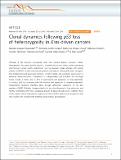Clonal dynamics following p53 loss of heterozygosity in Kras-driven cancers
Author(s)
Dorans, Kimberly; Chung, Katherine Minjee; Robbins, Rebecca; Tammela, Tuomas; Gocheva, Vasilena; Jacks, Tyler E.; Li, Carman Man Chung; Muzumdar, Mandar; ... Show more Show less
DownloadClonal dynamics.pdf (5.162Mb)
PUBLISHER_CC
Publisher with Creative Commons License
Creative Commons Attribution
Terms of use
Metadata
Show full item recordAbstract
Although it has become increasingly clear that cancers display extensive cellular heterogeneity, the spatial growth dynamics of genetically distinct clones within developing solid tumours remain poorly understood. Here we leverage mosaic analysis with double markers (MADM) to trace subclonal populations retaining or lacking p53 within oncogenic Kras-initiated lung and pancreatic tumours. In both models, p53 constrains progression to advanced adenocarcinomas. Comparison of lineage-related p53 knockout and wild-type clones reveals a minor role of p53 in suppressing cell expansion in lung adenomas. In contrast, p53 loss promotes both the initiation and expansion of low-grade pancreatic intraepithelial neoplasia (PanINs), likely through differential expression of the p53 regulator p19ARF. Strikingly, lineage-related cells are often dispersed in lung adenomas and PanINs, contrasting with more contiguous growth of advanced subclones. Together, these results support cancer type-specific suppressive roles of p53 in early tumour progression and offer insights into clonal growth patterns during tumour development.
Date issued
2016-07Department
Koch Institute for Integrative Cancer Research at MITJournal
Nature Communications
Publisher
Nature Publishing Group
Citation
Muzumdar, Mandar Deepak et al. “Clonal Dynamics Following p53 Loss of Heterozygosity in Kras-Driven Cancers.” Nature Communications 7 (2016): 12685. © 2017 Macmillan Publishers Limited
Version: Final published version
ISSN
2041-1723